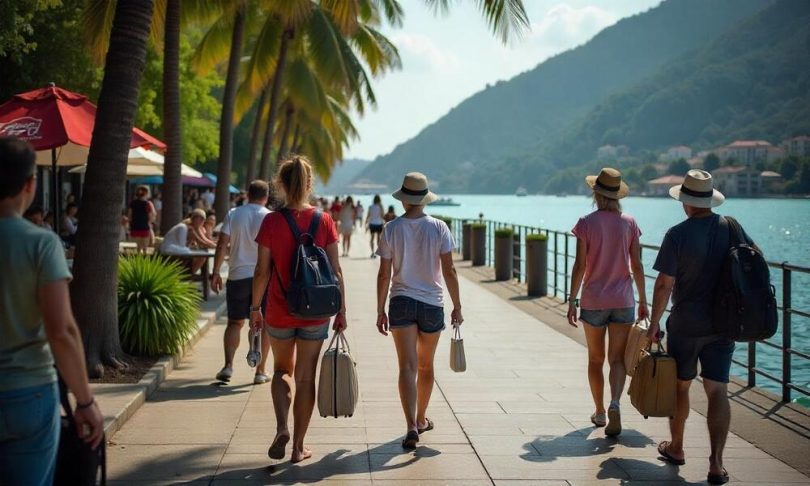Tuesday, May 27, 2025
US hotel bookings from Canada, Japan, Mexico, and Germany fall sharply as trade tariffs and tensions from the Trump administration reshape global travel habits.
Recent data shows a significant decline in hotel bookings to the United States from travelers in key countries such as Canada, Japan, Mexico, and Germany. This shift is closely tied to the trade tensions and tariff policies introduced during former President Donald Trump’s administration, which have reshaped global travel behaviors and preferences.
Travelers from nations most affected by these tariffs are increasingly reconsidering the US as a destination for their trips abroad. There is a noticeable drop in interest among tourists from these regions. The data highlights a growing reluctance to visit the US, driven by economic uncertainty and broader geopolitical concerns tied to ongoing trade disputes.
Specifically, the hotel search engine observed significant double-digit declines in bookings to the US from visitors based in Japan, Canada, and Mexico. These latter two countries were among the earliest targets of Trump’s tariff strategy, with a 25 percent tariff announced on February 1. The tariffs have created friction, particularly with Canada, where public sentiment has been especially sensitive. Canadian travelers reacted strongly against Trump’s repeated remarks suggesting that Canada might be better off as the fifty-first state of the US, a statement that fueled considerable discontent.
Beyond these countries, Trivago’s figures also point to a decline in demand from German travelers, though the drop is somewhat less severe, with a single-digit percentage decrease in hotel bookings. Germany, recognized as the largest economy in the European Union, has faced persistent threats of tariffs from the US administration, including the looming introduction of a 50 percent tax, which was recently “paused” but remains a concern for businesses and consumers alike.
Meanwhile, travel from the United Kingdom to the US has remained relatively stable. The UK has experienced some of the mildest tariff impacts compared to other nations and recently struck a notable trade deal with the US, which appears to have alleviated some of the economic uncertainties for British travelers. This agreement has helped maintain steady tourism flows between the two countries, even as tensions have escalated elsewhere.
The overall impact of these developments is creating anxiety within the US tourism industry, which is valued at approximately $2.6 trillion. Many operators and stakeholders worry about a “Trump slump” — a potential downturn in tourism linked to the broader economic turmoil caused by tariff conflicts and uncertain international relations.
Supporting this concern, preliminary data released by the US National Travel and Tourism Office showed an 11.6 percent drop in international visits to the US in March compared to the same month the previous year. This sharp decline reflects not only the tariff effects but also the wider economic headwinds facing global travelers.
On the domestic front, Trivago’s booking data suggests that American travelers themselves are tightening their budgets. There is a noticeable shift toward more economical choices, with higher demand for budget hotels and accommodations in lower star categories. This trend may reflect a more cautious spending approach amid inflationary pressures and economic uncertainty in the US.
It is important to note that Trump’s tariff measures have affected over 180 countries worldwide. However, many tariffs have been temporarily suspended, often for up to ninety days, to provide governments a window for negotiation and resolution of trade disputes. These pauses offer some breathing room, but the overarching uncertainty continues to influence consumer confidence and travel decisions.
Interestingly, while international travel to the US declines from certain countries, there is a simultaneous surge in domestic travel within other markets. For instance, the UK has witnessed a 25 percent year-on-year increase in demand for domestic trips during the critical summer months of July through September. This boost in local travel likely reflects a growing preference among UK residents to vacation closer to home amid economic caution and fluctuating international conditions.
Further analysis of Trivago’s data reveals London remains the top domestic destination for British tourists, followed by Edinburgh, which has seen a nearly 30 percent rise in booking demand. Other popular cities include York, Blackpool, and Manchester, all of which have experienced increased interest from travelers seeking alternatives to international journeys.
The combination of trade tariffs, economic uncertainty, and geopolitical tensions is reshaping travel behavior across multiple regions. While some international markets are pulling back from the US as a travel destination, domestic tourism in countries like the UK is gaining momentum. The ongoing dynamics in global trade policies will continue to influence these patterns in the near term, creating both challenges and opportunities for the global tourism sector.











